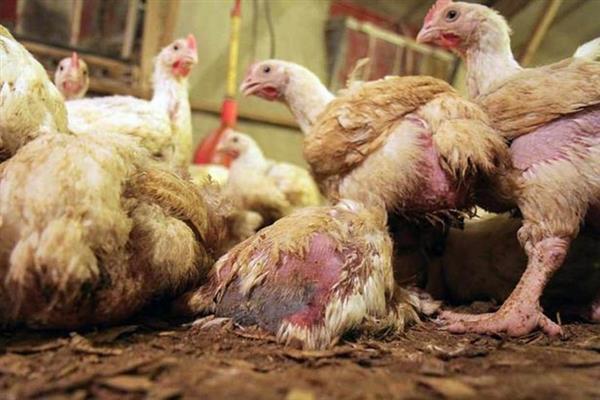‘Experts warn major health risks if not checked’
Srinagar: As the Kashmir imports approximately 5.5 crore chickens from Haryana and Punjab and around 36 lakh are produced locally, it has been observed that there is no process of testing these fowls, entailing a significant health risk to consumers.
Sources told KNS that there is as such no mechanism from government which could ensure that the chicken available in the markets is infection free.
Experts warned that most of chicken sold at the markets of the state are infected with deadly diseases and once they are consumed by humans, diseases of various kind are imminent. “The unhygienic chicks which are contaminated with infections like Campylobacter, Salmonella and E.coli are dangerous for human life” one of the Doctors of Animal husbandry Kashmir insisted not to be named told KNS.
He said that the prevalence rate is higher within the premises of the poultry farms where chicks are bred. “Unfortunately, in our state we don’t have many health officers who can take a regular inspection of the market as well as of the farms,”
Poultry farming has come up in a big way in Jammu, Srinagar, Baramullah, Kathua , Udhampur, Pulwama and Budgam districts, with large number of educated unemployed youth taking up poultry farming as a sustainable means of earning their livelihood.
According to rough assessment Kashmir imports around 5.5 crore chickens from neighboring Haryana and Punjab. 36 lakh chickens are produced locally.
The doctor maintained that there is as such no mechanism which could ensure that the chicken available in the market is infection free. “There are over 60 listed diseases associated with the poultry and they are common sources for the pathogens: Salmonella, Clostridium perfringens and Campylobacter. Some of these pathogens are often identified during processing but the exact source can come from several sources, including the poultry house environment, hatchery and through vectors such as equipment and personnel” he maintained.
Some serious illnesses that infected chicken can lead to include disease called ‘Gullian-Barre Syndrome’ which kills nearly 2 lakh people around the world every year.
Vector borne and other forms of disease are not the only problems the experts say but they said that chicken are also laced with antibiotics which can lead to resistance to anti-biotics in humans.
“The Poultry birds are heavily dosed with antibiotics. Without knowing their ill effects on human health these chickens are directly consumed by the humans and thus making us resistant to various antibiotics,” another veterinarian doctor posted in Srinagar said.
He said that those spurious antibiotics are readily available in the market and the farm owners feed their chicken with the same increasing the health hazard manifold.
He added that chicken raised for their flesh are often packed by the thousands into massive sheds and fed large amounts of antibiotics and drugs to keep them alive in conditions that would otherwise kill them.
“Only seven weeks after they are born, chicken are crowded onto trucks that transport them to the slaughterhouse. Every year, tens of millions of chickens have their wings and legs broken in the process. They are trucked through all weather extremes, sometimes over hundreds of miles, without any food or water. At slaughter, chickens are hung upside down and have their throats slit, and they’re often scalded to death in defeathering tanks,” the experts said.
They said that most chicken spend their entire lives in filthy sheds with tens of thousands of other birds, each getting less space than a sheet of paper, where intense crowding and confinement lead to outbreaks of disease. “Adult chickens can have trouble breathing and standing upright and will even topple forward because they’ve been bred to have abnormally large breasts.
More than 99 percent of broiler chicken carcasses sold in stores had detectable levels of E. coli, indicating fecal contamination,” the experts maintained.
As per the laboratory report testing released by Centre for Science and Environment (CSE), antibiotics are routinely pumped into chickens during their short life span of 30-45 days to promote growth so that they look bigger and also to treat or prevent infection.
The experts say that the government should immediately take measures in this regard and advised farm owner to follow a stringent 3-pronged protocol, Management, Bio-security and Vaccination are the three protocols a farm owner must follow. (KNS)

